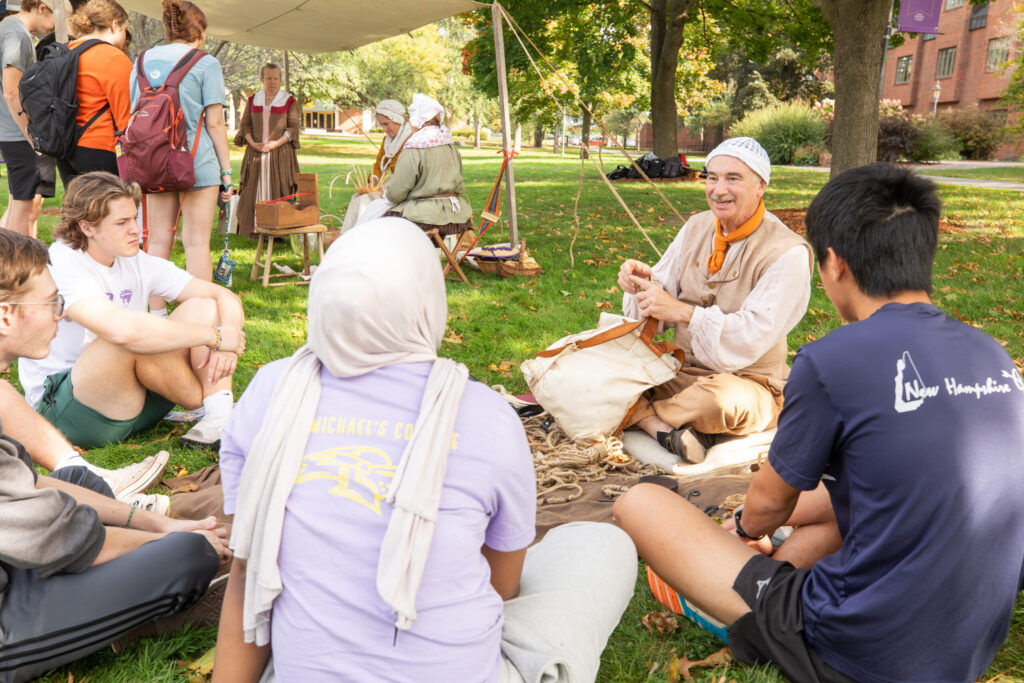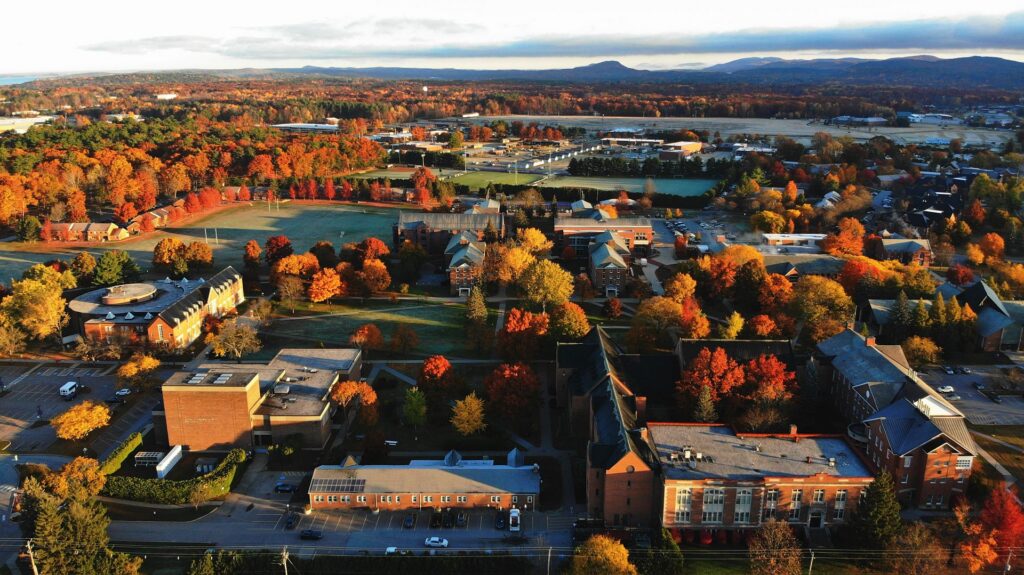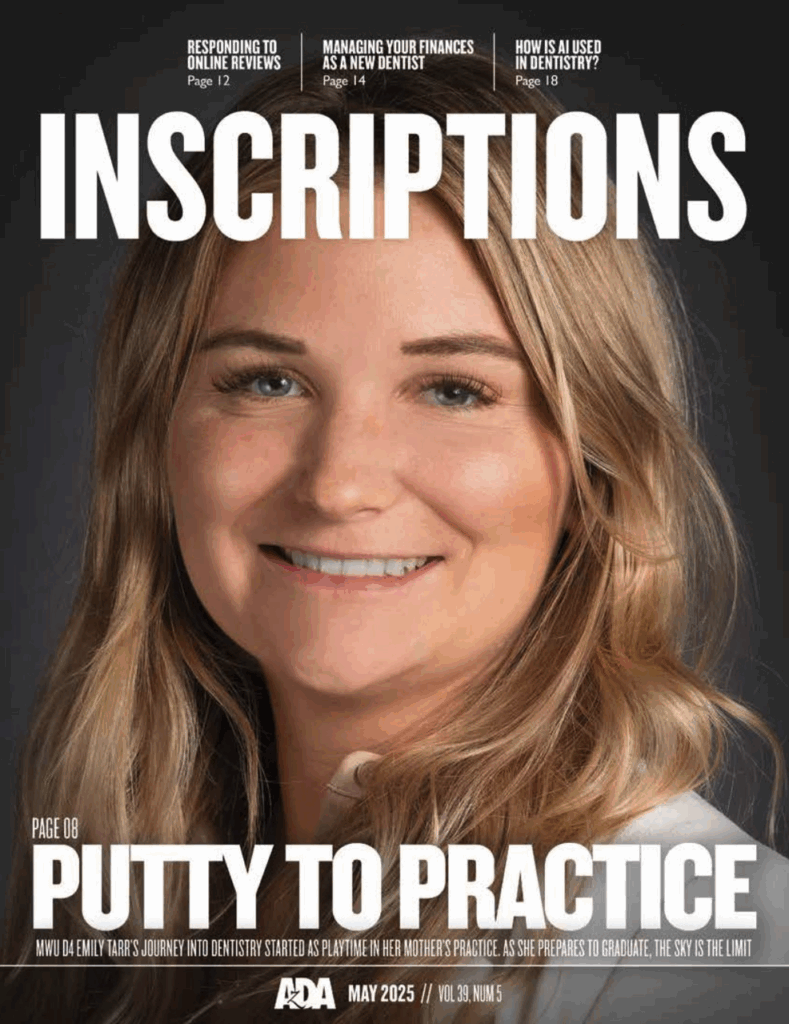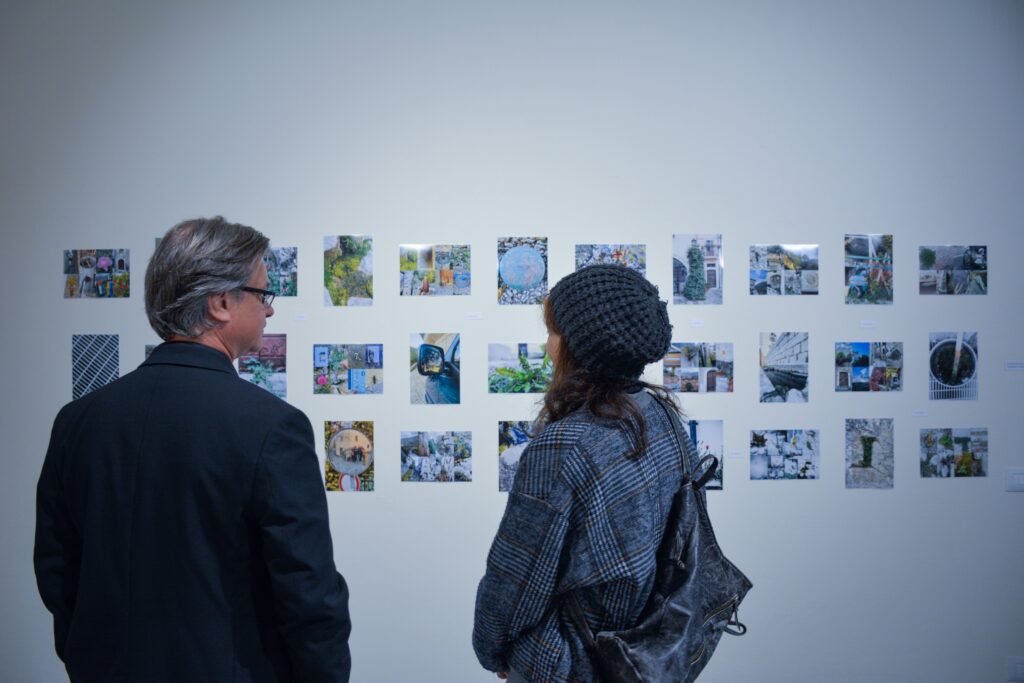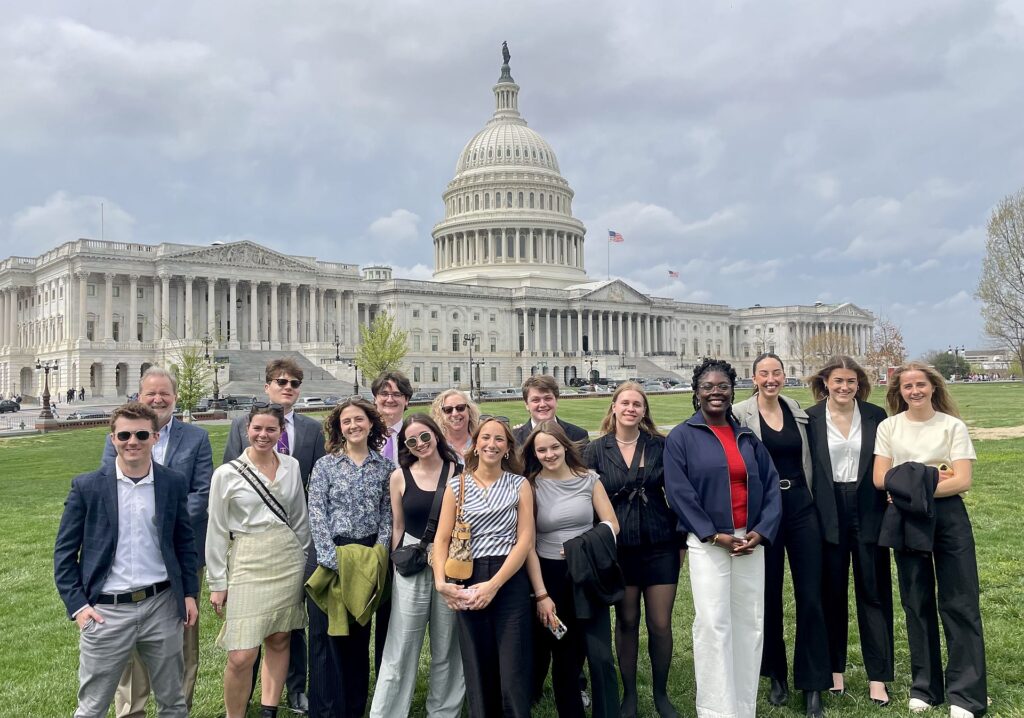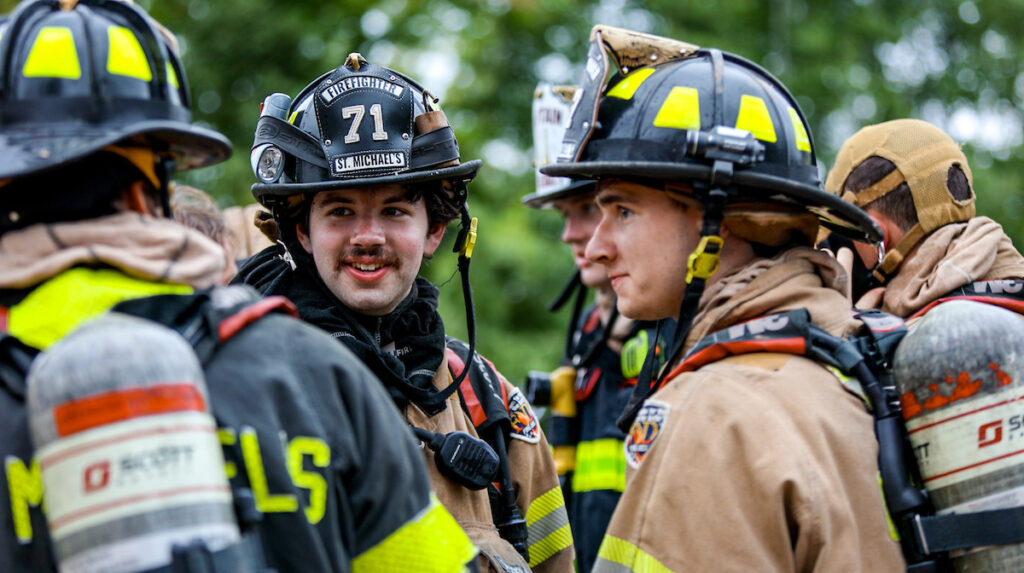Why study history? Survey of Saint Michael’s alums highlights wide applications for the academic field
History classes are not a requirement through the core curriculum at Saint Michael’s College – but, History Department leaders say a new survey has revealed a wide variety of applications for the field of study.
“History gets students to be far more curious about delving into the roots of what they’re doing and seeing the world through multiple lenses,” a skill set that can serve them in any context, said History Department Professor and Chair Jen Purcell. Whether students take one class or dive in headfirst with a major, studying history prepares students to be critical thinkers and exceptional communicators, Purcell said.
One of the greatest strengths of Saint Michael’s History Department is the breadth of the curriculum. Many people believe that a history degree limits graduates to a career in education, but a survey conducted by Braden Dwinell ’24 reveals otherwise. In fact, only 30 percent of History graduates from the College chose to enter the education field, and the remaining 70 percent explored a wide range of professions, including business, finance, government, and healthcare.
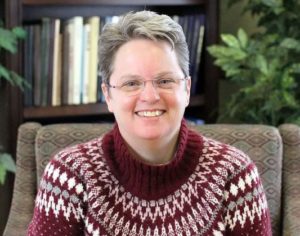
Professor Jennifer Purcell
“History is like a kaleidoscope,” Purcell said. “I think of what I do as not only changing perspectives but also adding color. I want to put more of those little colored pieces of glass into the picture so that it becomes far more diverse, complex, and interesting.”
The study of history allows students to view topics through diverse perspectives, meaning students gain more empathy and a deeper understanding of the complexities of lived experiences – transferable skills that allow them to thrive in a variety of fields and situations, Purcell said.
So, instead of asking, “What can you do with a history degree?” we should be asking, “What can’t you do with it?”
What to expect from Saint Michael’s History classes
According to Purcell, whether students are pursuing a major or just taking one class, they should expect their perceptions to be challenged above all else.
“It’s about being challenged to think about the complexity of the lived experience,” Purcell said. “I want you to feel uncomfortable because that’s the space that you learn in.”
A prime example of challenging beliefs and learning to be uncomfortable is the World War II class that Purcell teaches. In addition to the perspectives of those who opposed Adolf Hitler, she also incorporates the viewpoint of the Germans who supported the Nazis.
“There were compelling reasons that people supported the Nazi regime,” Purcell said. “The Nazis were very good at pulling people in and making them feel like they were a part of something bigger, something important.”
Students always push back, saying that the Nazi-supporting Germans were “different,” Purcell said.
“But my answer to them is they’re no different than anyone else,” Purcell said. “They’re human beings.”
She added, “I think it’s incumbent on all of us to be aware of how similar we are to other people that we think are different from us.”
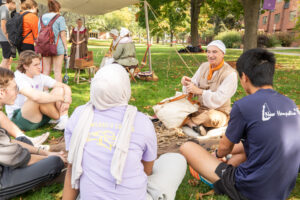
Benjamin Whitcomb’s Independent Corps of Rangers came to campus on Oct. 5, 2023, to teach students, faculty, and anyone on campus about the Revolutionary War. History Professor Alexandra Garrett arranged the half-day visit. (Photo by Cat Cutillo)
In addition to the empathy that history imparts, the soft skills it teaches—such as writing, research, and critical thinking—can serve as a complement to other disciplines. In fact, some of Purcell’s most successful students have been double majors, she said.
Purcell mentioned a student who graduated with a double major in History and Political Science who now works as a political consultant, assisting politicians in crafting their platforms. In a recent conversation, he mentioned to Purcell that his success in this role would not have been possible without his History major.
Purcell said the alumnus mentioned that lessons from History classes were particularly helpful when he had to package and create arguments about platforms and when he conducted research on politicians.
“History is not really about going into a specific place,” she added. “It’s about having skills—a number of skills, and complex skills—to be able to do a lot of different things.”
The Alumni Perspective
Caitlyn Burke ’14
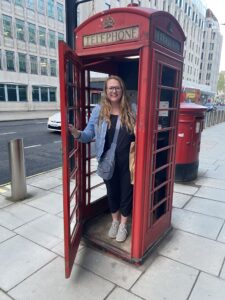 Caitlyn Burke completed a double major in History and English with minors in Art History and Peace and Justice while a student at Saint Michael’s. She currently works as the director of donor relations for the Herren Project. Founded in 2011 by former NBA athlete Chris Herren, the Herren Project is a nonprofit that aims to support and empower those affected by substance use disorder.
Caitlyn Burke completed a double major in History and English with minors in Art History and Peace and Justice while a student at Saint Michael’s. She currently works as the director of donor relations for the Herren Project. Founded in 2011 by former NBA athlete Chris Herren, the Herren Project is a nonprofit that aims to support and empower those affected by substance use disorder.
Burke’s passion for history ignited in grade school, where social studies was her favorite subject. After taking Advanced Placement U.S. History in high school, she was convinced that a history degree was the right path for her.
“The ability to think critically, write persuasively, and research effectively are three things I gained while studying history,” Burke said. She taps into these skills daily, relying on her historical knowledge to inform her decision-making at work.
One of her favorite courses at Saint Michael’s was offered in 2012, right before the presidential election. This course examined the history of elections, deepening her understanding of U.S. politics just in time for her to cast her first-ever vote.
Burke highly recommends that students consider a History major at Saint Michael’s.
“It’s a great department with professors who care about students as people,” she said. She especially appreciated the support she received from her professors and the engaging courses offered by the department.
Catie White ’18
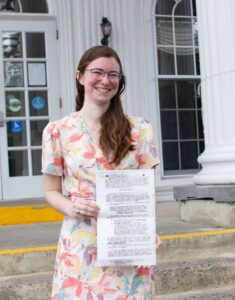
Catie White ’18 (Photo courtesy of Catie White)
Catie White completed a major in American Studies, with minors in Public History (a specialty within the History Department), French, and English. She was also the History Department’s first recipient of the Slaybaugh Award for excellent thesis presentation. She now works as the community services librarian and college archivist for Albertus Magnus College in New Haven, Connecticut. Through her position, she oversees programming and outreach and is also writing a comprehensive history of the college, which turns 100 next year.
Similar to Burke, White had a lifelong passion for history that led her to pursue a minor in it.
“I grew up with the American Girl dolls and I was obsessed with the Little House on the Prairie TV show,” White said. She added, “Then fast-forward a few years to my senior year of high school when I had the opportunity to intern with the Fairfield [Connecticut] Museum, and basically went, ‘Wait a minute—you can get paid to do this?’”
During her time at Saint Michael’s, White loved the freedom of the History Department and the professors’ willingness to say “yes” to curiosity. She fondly remembered asking now-Emeritus Professor Susan Oulette to be her thesis advisor, hoping to explore how women fought the American Revolution through textiles.
“She was like, ‘Yeah, let’s do it. Here’s a book on sheep,’” White said.
Another fond memory for White was the British Sitcom course taught by Purcell. She loved the uniqueness of the course, asking, “Who knew you could assign watching TV shows as homework?”
White applies her historical savvy in her daily work. Her History major also opened up numerous travel opportunities, White said. While at Saint Michael’s, she participated in the Burgundy Program with Professor Terryl Kinder, a study trip to Burgundy, France, the birthplace of the Society of Saint Edmund, which later founded Saint Michael’s College.
“You can read about medieval life and knights and castles until the cows come home, but until you’re in a castle in Burgundy … I just don’t think any other discipline can do that,” White said.
When asked why Saint Michael’s students should consider history classes, White said, “I would just say to do it, at least take a class.”
“There’s just something for everyone, and that’s what I enjoy here at Albertus – showing students the history of the college, because it’s something they can immediately connect with,” she said.
Additional takeaways from Dwinell’s alumni survey
- 83 percent of Saint Michael’s History alumni reported that their degree has helped them to reach their goals.
- The majority of History alumni of the College earn over $80,000 yearly.
- Over half of the alumni reported that they would recommend a History degree from Saint Michael’s to a prospective student.
- 67 percent of alumni pursued a graduate degree or graduate-level certificate program.
- The greatest strengths of the History Department, as identified by alumni, are the curriculum, the instructors, and the skills taught.

For all press inquiries contact Elizabeth Murray, Associate Director of Communications at Saint Michael's College.
